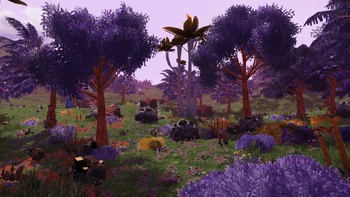| The subject of this article is from the Echoes update.
The information from this article is up-to-date as of 13 February, 2024. |
The information from this article is up-to-date as of 13 February, 2024.
| Biome - Lush | |
|---|---|
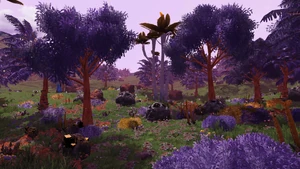
| |
| Type | Biome |
| Description | Earth-like planets. |
| Updated | Echoes |
Lush is one of the Biome varieties.
Summary[ | ]
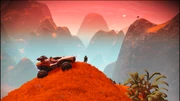
A mountainous Earth-like world
Worlds with lush biomes are characterized by colorful grass covering most of the surface. These are essentially the Earth-like planets. Depending on the amount of flora, trees can be sparsely found or sprawl into lush forests. Occasionally, one can find "Barren Lush" worlds where there is an almost, if not complete lack of flora, save for hostile vine whips. When viewed from space, it looks like it's covered by a carpet of grass. The resources Paraffinium, Star Bulb and Nitrogen can be found here.
These planets have the most varied types of Genera.
Some planets in survival and permadeath exist without aggressive sentinel presence.
Yellow stars in Norm and Harsh galaxies have 2x higher chance to have lush planets, yellow stars in Lush galaxies have 4x higher chance, and yellow stars in Empty galaxies have the same chance as other star types.
Name generation[ | ]
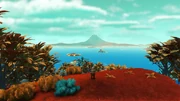
A lush planet with different colors.
The biome type is indicated in the information panel when the player exits their starship. This is procedurally generated by adding one of the following prefixes to the Planet or Moon text.
The sequence is taken from the game file.
- Rainy
- Verdant
- Tropical
- Viridescent
- Paradise
- Temperate
- Humid
- Overgrown
- Flourishing
- Grassy
- Bountiful
Conditions[ | ]
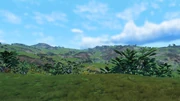
Some lush planets can be rather Earth-like.
- The weather here is the most ideal, as day and night temperatures don't enable hazard protection.
- Superheated rainstorms can occur. Hazard Protection drain is similar to being in a storm on a hot biome.
- Extreme weather lush worlds have seemingly everlasting rain, with superheated rainstorms occurring frequently. These storms are significantly more powerful, draining Hazard Protection in a similar rate as extreme heat storms in hot biomes.
Weather[ | ]
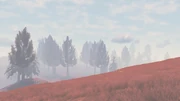
Extreme lush planets are rainy and have scalding hot rain storms.
| Sequence | Clear (No storms) | Normal | Extreme |
|---|---|---|---|
| 1. | Temperate | Boiling Puddles | Boiling Superstorms |
| 2. | Light Showers | Sweltering Damp | Intense Heatbursts |
| 3. | Mild Rain | Superheated Drizzle | Superheated Rain |
| 4. | Refreshing Breeze | Dangerously Hot Fog | Boiling Monsoons |
| 5. | Humid | Choking Humidity | Broiling Humidity |
| 6. | Pleasant | Mostly Calm | Painfully Hot Rain |
| 7. | Balmy | Occasional Scalding Cloudbursts | Torrential Heat |
| 8. | Mellow | Usually Mild | Blistering Floods |
| 9. | Beautiful | Blistering Damp | Scalding Rainstorms |
| 10. | Blissful | Lethal Humidity Outbreaks | Torrid Deluges |
Extreme weather does not necessarily mean that the planet has extreme storms. This is extremely rare to happen. The weather will still be in red text on arrival and in orange text in the analysis visor, but there will be no activated resources and the storms will not be extreme.
The following planets (or systems that contain such a planet) are examples of this happening:
Exotified Planet Weather[ | ]
Some lush planets have different weather descriptors. These planets never have storms, apart from ones with extreme weather, shown by the presence of activated stellar metals. The storms on those planets do not drain hazard protection. Planets with these weather descriptors show signs of exotification, either through bubbles on the surface, or by having minerals or flora that's typical for Exotic planets on their surface. These weather types are also found on Mega Exotic planets.
- Bilious Storms
- Echoes of Acid
- Deadly Pressure Variations
- Harsh Toxic Wind
- Corrupted Blood
- Inescapable Toxins
- Clouds of Haunted Green
- Invisible Jade Winds
- Infinite Toxic Mist
- Poison Cyclones
Exotification[ | ]
As of the Origins update, some lush planets are undergoing exoticification. There are multiple signs:
- The presence of bioluminescent grass and flora.
- Objects normally found in exotic planets are present and plentiful.
- Storms don't affect hazard protection.
- Abnormal weather (e.g. Corrupted Blood)
- The starship computer showing an "Anomaly Strength"
Civilised space[ | ]
- The lush biome is one of the 2 biomes to be considered candidates for Garden Worlds by the Arcadia Project, alongside the frozen biome.
Additional Information[ | ]
- The name generation and weather with their sequence are extracted from the 1.77 version of NMS_UPDATE3_ENGLISH.MBIN game file.
Related Articles[ | ]
Release History[ | ]
- Prior to 1.38 nearly all gaia planets in survival and permadeath had aggressive sentinel presences forcing the player to face some challenge at all times on any given biome.
- Prior to 1.38, lush worlds in certain areas experienced acid storms instead of cold storms.
- As of 1.38, heatstorms were added to lush worlds instead of acid storms. It would also replace most if not all cold storms. This coincided with the addition of desert worlds with nightly freezing temperatures.

